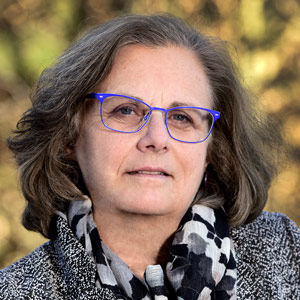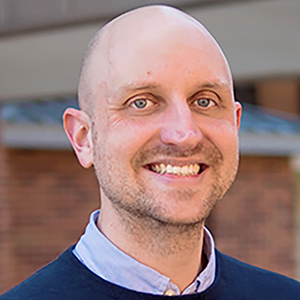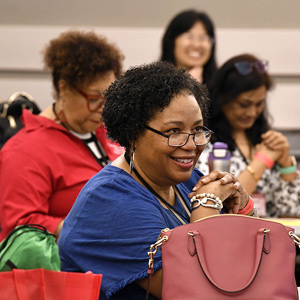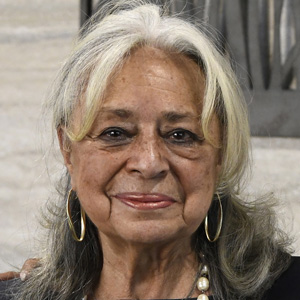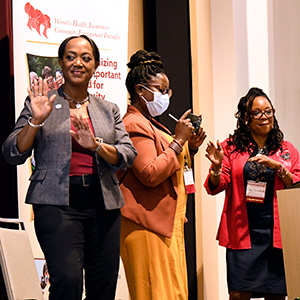The NIEHS Women’s Health Awareness (WHA) program debuted its newly redesigned newsletter website July 7, and it’s loaded with important health information, inviting graphics, easy navigation options, and a cell phone-friendly display.
 “We support the U3 population of women: the understudied, the underrepresented, and the underreported,” said Packenham. (Photo courtesy of Steve McCaw / NIEHS)
“We support the U3 population of women: the understudied, the underrepresented, and the underreported,” said Packenham. (Photo courtesy of Steve McCaw / NIEHS)“The newsletter is designed with the specific needs of the WHA community in mind,” said Joan Packenham, Ph.D., who directs the Office of Human Resource Compliance (OHRC) and chairs the WHA’s Steering and Planning Committee. “We developed it so that we can continually engage and inform the community about important environmental health and chronic health topics, and increase community resiliency and promote health equity.”
WHA addresses environmental health disparities among underrepresented, underreported, and understudied women. Its mission is to inform and empower women to take responsibility for their health and advance equal access to services, resources, and products that best help them prevent and reduce poor health. The web page was designed to support the needs of the WHA population.
Improving access
“We are always thinking about ways to improve access to our information,” said Packenham. “Most of our population use their cell phones rather than a computer.”
Regular features include environmental health information, nutrition tips (with recipes), reading recommendations, and a section called Recenter, Refocus, Recharge, which includes mindfulness-based stress reduction techniques.
“We felt like we needed to help women with strategies for decreasing stress,” Packenham noted.
 This Nutrition Corner page on the WHA newsletter shows a recipe for mixed-up eggs and spinach. (Photo courtesy of NIEHS)
This Nutrition Corner page on the WHA newsletter shows a recipe for mixed-up eggs and spinach. (Photo courtesy of NIEHS)Featured newsletter content
Hot Health Topic
This newsletter section address emerging health issues. Past issues have included Know the Facts: COVID-19 Vaccines, Beyond the Vaccine: Be Your Own Advocate, Black Maternal Mortality: A Crisis in America, and Do Not Delay Medical Care During COVID-19. A special section called Myth Busters in the Winter 2021 issue addressed the issue of false information about the COVID-19 vaccines.
Environmental Health
The newsletter addresses topics important to the WHA population, with content such as Climate Change Impacts Your Health, Mammograms and COVID-19 Vaccines, Obesity and Obesogens, and Breast Cancer Risk Associated with Permanent Hair Dye and Straighteners.
Sister to Sister Advocacy Corner
The Summer 2021 issue, published in July, includes a new feature called Sister to Sister, in which women share their health stories. The Sister to Sister Advocacy Corner highlights women who are courageously overcoming their health struggles, advocating for their own health, seeking to live healthier lives, and sharing advice and encouragement with their community. The inaugural piece is about a young woman who is experiencing what has become known as long-haul COVID-19.
Health equity and disparities
The WHA program was launched in 2015 as a community engagement initiative sponsored by the NIEHS Clinical Research Branch, Office of Human Research Compliance, with the goal of decreasing environmental health disparities for women by improving their health resiliency and health equity through better access to information and services. The program is also supported by the National Institutes of Health Office of Research on Women's Health.
 The Women’s Health Awareness newsletter — “Embark upon your journey to a healthier you.” (Photo courtesy of NIEHS)
The Women’s Health Awareness newsletter — “Embark upon your journey to a healthier you.” (Photo courtesy of NIEHS)“Half the battle is knowing what resources are available and having access to them,” said Packenham. “Women take care of everybody, so when a woman gets information, nine times out of 10 she is going to share it.”
Past WHA conferences — in-person and online — have put a premium on providing information and, where possible, direct access with experts and clinicians.
The program’s last in-person conference, held in 2019, drew more than 1,200 women from 35 North Carolina counties and several other states, and included 34 sessions on environmental health, pulmonary health, diabetes, cancer, cardiovascular health, reproductive health, and behavioral health. In addition, there were 13 onsite screenings for diabetes, cancer, and other conditions.
WHA's April 2021 virtual conference focused on racism and health, drawing more than 1,100 registered participants from 55 North Carolina counties and more than 40 states. The conference came at the end of a six-month schedule of webinars focused on chronic disease and environmental health, engaging more than 2,500 people, according to Packenham.
“We have partnered with more than 150 organizations including various academic and medical institutions, government agencies, nonoprofit groups, and grassroots organizations,” Packenham said. “WHA is designed as a multilevel interventional platform focused on eliminating environmental public health disparities through targeting broad environmental and social determinants of health.”
Lynae Baker, a program specialist at the OHRC, works closely with Packenham. “We hear directly from the community about their health issues,” Baker said. “We want to continue to decrease environmental health disparities and reach for health equity.”
(John Yewell is a contract writer for the NIEHS Office of Communications and Public Liaison.)





